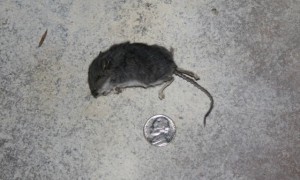 I like to keep a neat house, but it’s not always clean-neat. Picking-up is easy compared to breaking out the Pine-sol, Windex, and Pledge. This last week, however, the kitchen took on a strange air that none of us could identify. It wasn’t exactly smelly, but something wasn’t quite right.
I like to keep a neat house, but it’s not always clean-neat. Picking-up is easy compared to breaking out the Pine-sol, Windex, and Pledge. This last week, however, the kitchen took on a strange air that none of us could identify. It wasn’t exactly smelly, but something wasn’t quite right.
As the days passed, every so often we’d get a whiff of wierd, and finally, after a week, whatever it was began to reek. Birgitta, Louisa, and I opened every drawer and cabinet, leaning in for repeated sniffs, desperate to find the problem. Was it rotting food in the waste can? In the disposal? Under the stove? In the drain pipe?
None of those.
Although we kept hunting, we also lit scented candles and sprayed room deodorizer. Whatever it was, it continued to worsen until we were gagging and unable to eat anywhere near the kitchen. What in the world was it?
Today we found out.
Reaching into the cabinet beneath the kitchen sink, I twisted to the right to get a pair of rubber gloves hanging over the drain pipe when I saw it. Snuggled up next to the back of the Kitchen Aid mixer was a dead field mouse. At least I thought it was dead. He hadn’t moved as I’d rummaged around at close range, and the smell in the back of the cabinet was absolutely putrid.
So I did what any woman would do. I insta-backed out of the cabinet and slammed the door.
Later when I showed Louisa what I’d found, we marveled at how tiny the little mouse was and how big its stench. It reminded me of a tiny word that always brings big stink into our lives: sin.
Because the devil is very clever, he coaxes us toward evil in mini-bits. “A little won’t matter,” he says. “Besides, no one needs to know.” And for a time, that may be true. But as Scripture says, what we do on the Q.T. will eventually be spotlighted…. when its smell has grown so big it dominates us and disgusts those around us. Our best bet is to clean it out in its early stages, well before it begins to rot us.
 As for our mouse, since I was the one who’d put De-con poison in the back of the cabinet, I was elected to take him out. Though he seemed dead and his odor confirmed it, I wondered if he would run up my sleeve when I tried to grab him. In the end, I double-bagged my hand, let out a long, loud yell, and picked him up. Sure enough, he was dead.
As for our mouse, since I was the one who’d put De-con poison in the back of the cabinet, I was elected to take him out. Though he seemed dead and his odor confirmed it, I wondered if he would run up my sleeve when I tried to grab him. In the end, I double-bagged my hand, let out a long, loud yell, and picked him up. Sure enough, he was dead.
Not long after that, the comforting scent of Pine-sol filled the room, and our women-against-beast adventure was over. If only it was that easy to rid ourselves of sin.
“Dead flies [or mice] make the perfumer’s ointment give off a stench; so a little folly outweighs wisdom and honor.” (Ecclesiastes 10:1)





